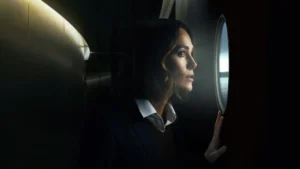Summary
‘The Equalizer’ surges along on Denzel Washington’s star power and Antoine Fuqua’s underappreciated direction, reviving a classic property for a new era.
I know what you’re thinking as you ponder over this review. – and so does The Equalizer. Most critics won’t ever peep their heads out from beneath the comfortable blanket of their own intellectual superiority for long enough to admit they enjoyed an action movie.
They’d rather propagate the easy stereotype that they’re only to be enjoyed unironically by working-class whooping man-children, and ironically as some kind of guilty pleasure. All horseshit. The Equalizer knows this.
The Equalizer (2014) Review and Plot Summary
Anticipated it, clearly. In the movie, Denzel Washington plays Robert McCall, an ex-military something-or-other currently eking out a quiet life as the manager of a big-box hardware store in Boston. Really, though, he’s just Denzel Washington. And that’s why The Equalizer works so well.
It isn’t a bold or new idea to hand generic material to a well-respected star. Almost always works, though. It certainly did for Liam Neeson, who, in his late-fifties and early-sixties, found a new lane to stomp along in: Super Dad. In the movie, Denzel sports dad jeans, but appears to be childless.
He’s channelling something else. Pure, unrefined, weaponized cool. It doesn’t matter where you stand on him as a star; whether you can find an intelligible definition for what you’re seeing. Denzel simply is. And he is whether he’s pushing a dolly around Not Home Depot, or walking calmly away from a massive explosion. He is the equalizer, as a character. But he’s also The Equalizer, as a movie. It’s all him.
READ: Movies like The Equalizer
This isn’t to undermine what else is there; just to acknowledge that it wouldn’t be there without him. But, yes, there’s more to this film than just Denzel Washington. It’s written with terse efficiency. It fattens slim characters with interesting quirks and traits.
Then there’s Antoine Fuqua’s perennially underappreciated action-movie direction, and the broody cinematography of Mauro Fiore – those two respectively directed and shot Training Day, which also starred Washington.
This movie isn’t as narratively ambitious, but it captures the same corrupt underside of cops-and-robbers culture. It’s grisly and relentless; absurd and, in its way, rewarding. You can get off on a power drill being plunged through someone’s skull as long as the driller is on the side of moral decency, and the drillee more or less deserves it.

This is the kind of movie that can open with a shot of a blaring alarm clock – 07:30am – and then slowly pan through a pristine apartment to its owner, Denzel, already fully-dressed in the bathroom, buzzing his bald head.
The stubble here is grey for gravitas. The moony enormity of the head itself is almost a character. You see it looming in dark alleyways and floating along store aisles. Occasionally it fills the screen, the front or back of it – both usually expressionless.
Sometimes Denzel turns the edges of his mouth up or down, which for most people would constitute a smile or a frown, but his weathered visage isn’t typical expressive territory. My favourite Denzel face-pull is the self-critical pursing of the lips that he reserves for a killing spree that lasts a few seconds longer than he predicted.
This version of The Equalizer is based on the smooth late-80s TV series that starred Edward Woodward. His Robert McCall was cleaner and more politically-correct; Denzel’s is colder, harder, more reptilian. It’s harder to justify but easier to dramatize.
McCall beats his alarm clock in this movie because he doesn’t sleep; instead he spends his nights sipping tea in an all-night diner (he takes his own teabag) and explaining the lessons of classic literature to an underage prostitute (Chloe Grace Moretz).
The hooker’s name is Teri to her clients and Alina to McCall; what she half-absorbs from The Old Man and the Sea is that maybe she could become Alina to everyone. No such luck. Her Russian pimp (David Meunier) tries to beat the idea out of her. Almost succeeds. But in doing so he attracts the attention of McCall, who shows up at the gangster’s restaurant office with $9800 – enough, he hopes, to buy her freedom. Again, no such luck.
You know something’s up with McCall. But until this scene, you never quite know what. There’s no action preceding this, and the naïve way McCall slides the envelope full of bills across the table suggests a different movie, one in which McCall is as pathologically decent but less prone to murder.
Once the camera starts to zero in on various nasty-looking implements – a gun, a switchblade, corkscrews, a lowball glass – you recognise the kind of movie you’re watching. McCall times his Good Samaritanism to the second. It takes him 19 to dispatch the five hoods in the room – technically 28, but he subtracts the 9 seconds he wasted in twisting one of the corkscrews up through someone’s chin.
You’d imagine McCall’s on-the-clock murderous persona to be his Mr. Hyde; the friendly older gentleman his Dr. Jekyll. But Denzel lends the same even keel to both versions of the character. Doesn’t matter if he’s sanding wood or breaking necks – he’s the same guy.
After killing everyone in the restaurant, he sits beside the lead pimp, who’s bleeding to death on the floor, and calmly tut-tuts him about not taking the offer. He seems genuinely disappointed.
One of the more interesting ideas that The Equalizer posits is that McCall’s disappointment is not in how the pimp engineered his own fate, but in how he lured McCall’s deeply-entrenched killing instincts back to the surface.
The implication is that this is something McCall goes to great lengths to suppress; that he continually struggles to not kill people. After this massacre, for the first time in the movie, McCall sleeps like a baby.
Written down, his behaviour sounds psychopathic, but the character never feels like that. He’s a human being who acts inhumanely, but the audience understands it’s because of a perverse surplus of morality. He’s so righteous that his only option is to rid the world of evil – “because he can”, to use his own words.
This would never work in a movie that was even a little bit more serious. But The Equalizer only ever paddles in the shallowest or deepest ends of the moral pool. McCall’s friends and colleagues are all honest, innocent, hard-working salt-of-the-earth types, and his cartoony desire to help all of them just feels right. His adversaries are flagrantly sadistic.
A stable of corrupt cops; heavily armed hit squads; a satanically-tattooed enforcer (Marton Csokas) – all puppets dancing on a Russian oligarch’s strings. They’re irredeemable. Murdering them feels just. There’s no grey in The Equalizer, but there is black and white.
Denzel being black is scarcely mentioned, but it’s not a coincidence that most of his friends aren’t white, or that he lives in a run-down walk-up in a multi-ethnic neighbourhood, or that his enemies are all pale Slavs who glower from the windows of glass-and-steel skyscraper penthouses.
You root for McCall because he’s on the side of good, old-fashioned decency. Most people have quietly wished they could eradicate their problems as easily as he does.
Does The Equalizer prove that Denzel Washington is versatile?
The Equalizer is preposterous – no doubt about that. But the steady opening and deliberately-paced second act prevent it from descending into gonzo action territory; it remains, if not reserved, then at least restrained enough to not become ironic, and even the bananas Home Alone-style finale set among the aisles of the hardware emporium at which McCall works is shot with real skill and dramatic consideration.
You’ll struggle to find a superior slice of Hollywood action craftsmanship in any other picture released in 2014, and I say that about a sequence that incorporates barbed-wire nooses and a glass-shard fight on shattered mirrors.
It’s often easy to forget that Denzel Washington’s filmography is as stuffed with awards-worthy dramas as it is with low-budget action thrillers, but The Equalizer is a nice reminder that not only can he do both, he can do both at the same time.
You needn’t worry about his particular brand of great acting being lost in buddy-comedy silliness like 2 Guns, or indeed the grim redemptive bloodbath of this movie. I don’t know if you could call The Equalizer a great movie.
But you can certainly call it a great version of this particular kind of movie; wrongs are righted, evil is vanquished, and the ordinary man in a button-down shirt triumphs over all. It’s uncomplicated, satisfying and silly. Sometimes that’s all we need.




